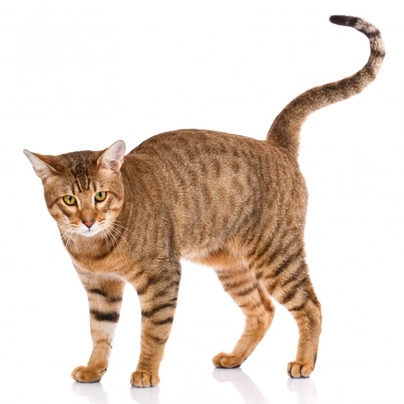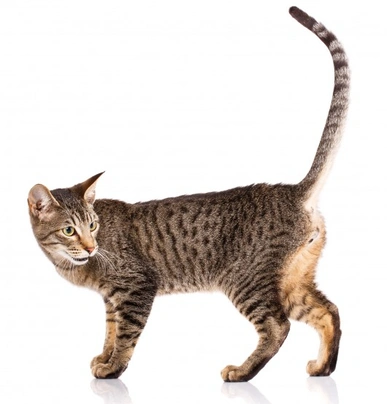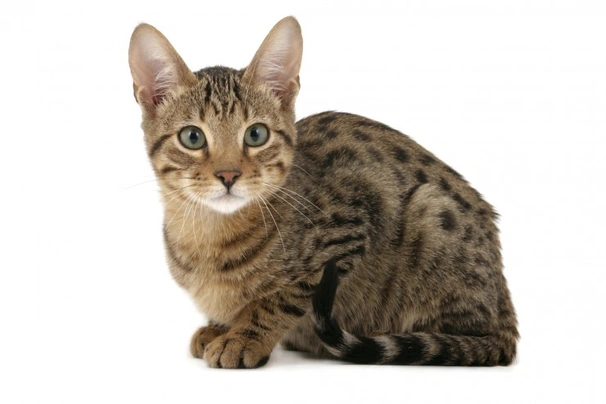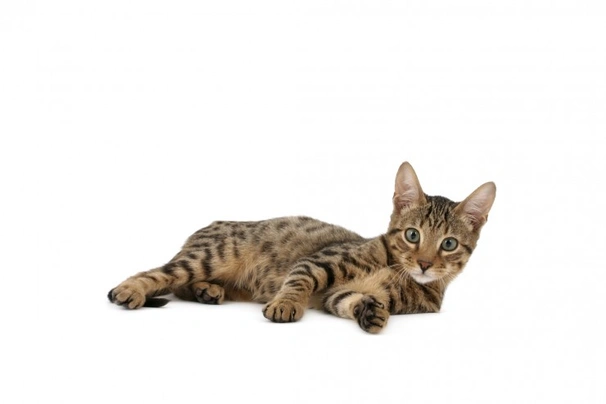Serengeti
Introduction of the Serengeti
The Serengeti is an attractive medium sized cat and one that boasts having longer legs than most other breeds. Like the Bengal they are highly skilled hunters and love nothing more than to explore the great outdoors but a cat should only if allowed to roam outside if it is safe for them to do so. Serengetis are a new breed having been developed in the United States in the mid-nineties and since they first appeared on the scene Serengetis have found fan bases in many countries of the world thanks to their wild looks and kind loyal albeit sometimes demanding natures.
History of the Serengeti
The Serengeti was first developed during the nineties in the United States by a Californian breeder and conservation biologist by the name of Karen Sausman. She wanted to create a cat that boasted a kind nature but which had the looks of an African Serval although the Serengeti does not have any serval in their lineage whatsoever. She achieved her goal by crossing Bengals with Oriental Shorthairs.
It was not long before other breeders around the world showed an interest in Serengetis and set about breeding them too. Today these charming cats although a relatively new breed have found their way into the hearts and homes of many people thanks to their wild looks and their kind alert and loyal natures. For the moment the breed is not recognised by the GCCF (October 2016) but they are registered with TICA as a preliminary new breed.
Appearance of the Serengeti
The Serengeti is an attractive medium sized cat and one that boasts having longer legs than the average domestic feline. They are graceful elegant and statuesque cats with strong muscular bodies. They stand very upright which is accentuated by the fact they have long necks and lovely large ears. Their heads are longer than they are wide being a modified wedge shape and having a slight break at their whiskers.
As previously mentioned the Serengeti has large ears that are wider and deeper at the base but with lovely rounded tips. Their ears are set close together and very upright on a cat's head. Another gorgeous feature of the breed are their large rounded eyes which are set nicely apart and which boast being either a gold or yellow colour although some Serengetis have hazel to light green eyes too. They have strong chins which line up with a cat's nose and muzzles are medium in length being moderately full with nice rounded whisker pads.
They have moderately wide noses that are an even width right to the tip and when seen in profile there's a straight line from a cat's nose to their brow before it slopes gently to the top of the head. Their necks are long and flow nicely into the shoulder. The Serengeti boasts having a semi-foreign body that’s solid having a good depth to it. Their shoulders and rumps are level which gives them their upright stance with males being quite a bit larger than their female counterparts. They have very long well-muscled legs that show a medium amount of bone and their feet are oval shaped and medium in size. Tails are thick but taper slightly from the base to the tip being moderately long.
When it comes to their coat the Serengeti boasts having a short and even coat that's dense but fine to the touch. They come in a several colours which are as follows:
- Tabby - any shade of brown which a good contrast in colour between spots and their ground colour. Underbellies chins and the front of a cat's muzzle are light to white in colour. The backs of their ears have an eye spot
- Solid - a cat's coat is black with ghost spots
- Silver/Smoke - cats have black spots on a clear silvery coat
Their patterns are random spots or a solid colour with cats having spots on their shoulders and hips that extend down their legs and their tails have black rings on them from the base to the tip.
Temperament of the Serengeti
Like other breeds the Serengeti likes a routine and doesn't particularly like it when this changes for any reason. They like to be fed at the same time of the day and don't appreciate it when furniture gets moved around the home which can often stress cats out. With this said they are known to be confident friendly cats by nature although they can be a little shy when they first arrive in a new home. However once they are settled they form extremely strong bonds with their owners and will follow them around from room to room just to be with them.
They thrive in a home environment and love being included in everything that goes on around them. They are extremely energetic and agile cats that like to be perched up high whenever they can. They are also known to be quite talkative which is a trait they have inherited from the Oriental. They will happily hold long conversations with their owners whenever they are spoken to and Serengetis are always quick to give an opinion on something and will soon let an owner know when it's their meal time.
Because they form such strong bonds with their families Serengetis are best suited to households where at least one person stays at home when everyone else is out so they are never left on their own for any great length of time. They also do that much better in households where there are other pets whether it’s a dog or another cat.
Intelligence / Trainability of the Serengeti
The Serengeti is an intelligent cat and one that learns new things quickly. They boast a lot of energy and enjoy playing interactive games which includes things like "fetch". They also love to "hunt" and are good at problem solving which in short means investing in lots of good quality interactive toys if you are planning to share a home with one of these agile active and extremely smart cats.
Children and other
Serengetis with their outgoing affectionate personalities are the perfect choice for families with children. They are quick on their feet and therefore know when to get out of the reach of smaller children when they get too boisterous or loud. However care should be taken when very young children are around cats and any interaction should always be well supervised by an adult to make sure things stay nice and calm. With this said children need to be taught how to behave around cats and when it's time to leave them alone.
They also get on well with dogs and other cats especially if they have grown up together in the same household and have been introduced to each other properly. However care should be taken when introducing a Serengeti to a dog they don't already know just in case the dog does not get on with their feline counterparts. They are social by nature and have been known to get on with pet birds and some small animals but it is in a Serengeti's nature to hunt their prey which means care should be taken when first introducing them to any smaller pets in a household just to be on the safe side.
Health of the Serengeti
The average life expectancy of a Serengeti is between 8 and 12 years when properly cared for and fed an appropriate good quality diet to suit their ages.
The Serengeti is thought to be a healthy breed and one that to date does not appear to suffer from any hereditary or congenital health disorders that often affect other breeds. However it's worth noting the breed is still in its infancy but with careful and selective breeding these charming cats should remain healthy. With this said breeders should have stud cats tested for the following condition:
Gangliosidosis - Breeders should have stud cats DNA tested
Caring for the Serengeti
As with other breeds Serengetis need to be groomed on a regular basis to make sure their coats and skin are kept in top condition. On top of this cats need to be fed good quality food that meets all their nutritional needs throughout their lives which is especially true of kittens and older cats.
Grooming of the Serengeti
Serengetis boast having short close lying dense coats and as such they are low maintenance on the grooming front. A weekly brush and wipe over with a chamois leather is all it takes to keep their coats in good condition with a nice sheen on it. Like other breeds they tend to shed the most in the Spring and then again in the Autumn when more frequent brushing is usually necessary to keep on top of things.
It's also important to check a cat's ears on a regular basis and to clean them when necessary. If too much wax builds up it can lead to a painful infection which can be hard to clear up. In short prevention is often easier than cure with ear infections. Cats often suffer from ear mites which can be a real problem which is another reason why it's so important to check their ears every week or so.
Exercise of the Serengeti
The Serengeti is an extremely active energetic cat and one that enjoys being kept busy. They learn new things quickly and this includes playing interactive games with their owners. They love to be able to roam around in the great outdoors but cats should only be allowed to go outside if it is safe for them to do so. The good news is that Serengetis adapt well to being kept as indoor pets providing they are given lots of attention and things to do so that boredom does not set in.
Cats kept as indoor pets need to have lots of places they can snuggle up for a snooze when the mood takes them because if there is one thing all cats like doing which includes the Serengeti it’s taking a cat nap or two during the day. They also like to perch up high so they can watch the world go by from a favourite vantage point which means building lots of interesting platforms for them to use when the mood takes them.
Feeding of the Serengeti
If you get a Serengeti kitten from a breeder they would give you a feeding schedule and it's important to stick to the same routine feeding the same kitten food to avoid any tummy upsets. You can change a kitten's diet but this needs to be done very gradually always making sure they don't develop any digestive upsets and if they do it's best to put them back on their original diet and to discuss things with the vet before attempting to change it again.
Older cats are not known to be fussy eaters but this does not mean they can be given a lower quality diet. It's best to feed a mature cat several times a day making sure it's good quality food that meets all their nutritional requirements which is especially important as cats get older. It's also essential to keep an eye on a cat's weight because if they start to put on too much it can have a serious impact on their overall health and wellbeing. Like all other breeds Serengetis need access to fresh clean water at all times.
Serengeti price
If you are looking to buy a Serengeti you would need to pay upwards of £250 for a well-bred kitten and you would need to register your interest with breeders and agree to being put on a waiting list because not many well-bred kittens are available every year. The cost of insuring a male 3-year-old Serengeti in northern England would be £15.53 a month for basic cover but for a lifetime policy this would set you back £27.04 a month (quote as of April 2018). When insurance companies calculate a pet's premium they factor in several things which includes where you live in the UK a cat's age and whether they have been neutered or spayed among other things.
When it comes to food costs you need to buy the best quality food whether wet or dry making sure it suits the different stages of a cat’s life. This would set you back between £15 - £20 a month. On top of this you need to factor in veterinary costs if you want to share your home with a Serengeti and this includes their initial vaccinations their annual boosters the cost of neutering or spaying a cat when the time is right and their yearly health checks all of which quickly adds up to over £600 a year.
As a rough guide the average cost to keep and care for a Serengeti would be between £40 to £60 a month depending on the level of insurance cover you opt to buy for your cat but this does not include the initial cost of buying a well-bred kitten.



